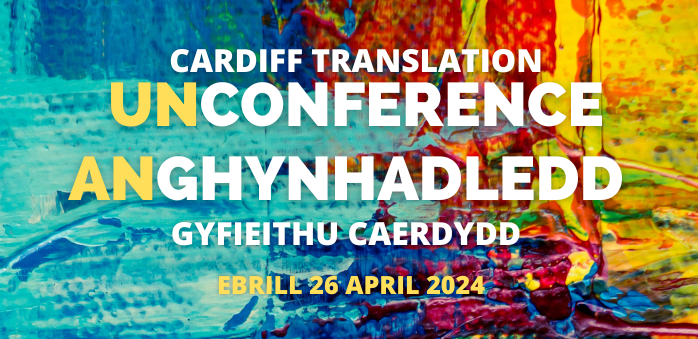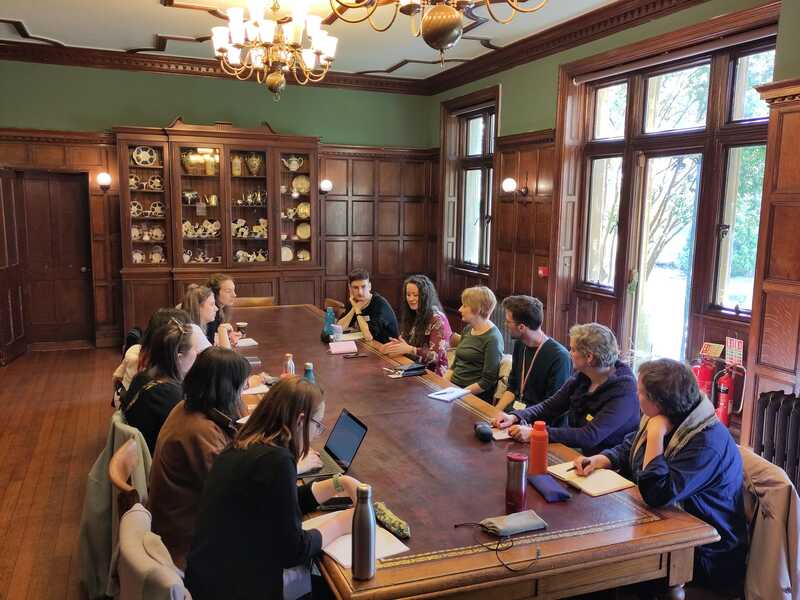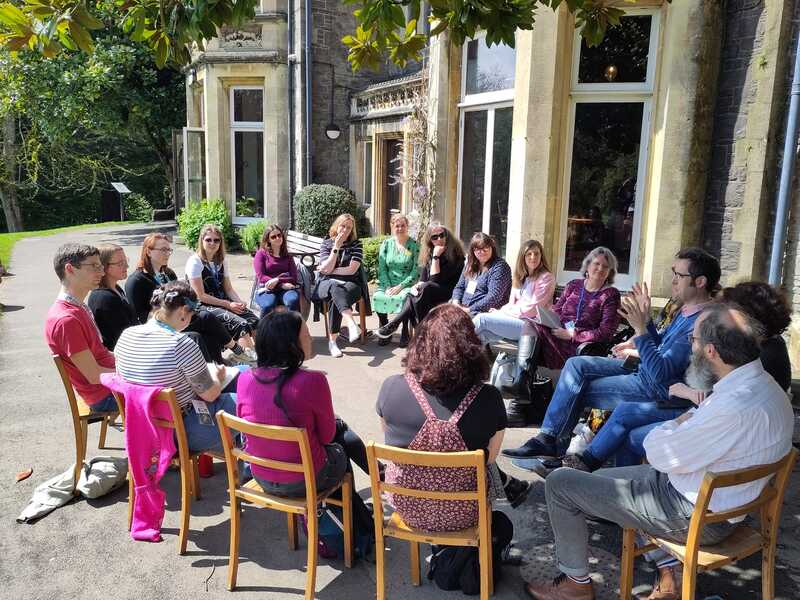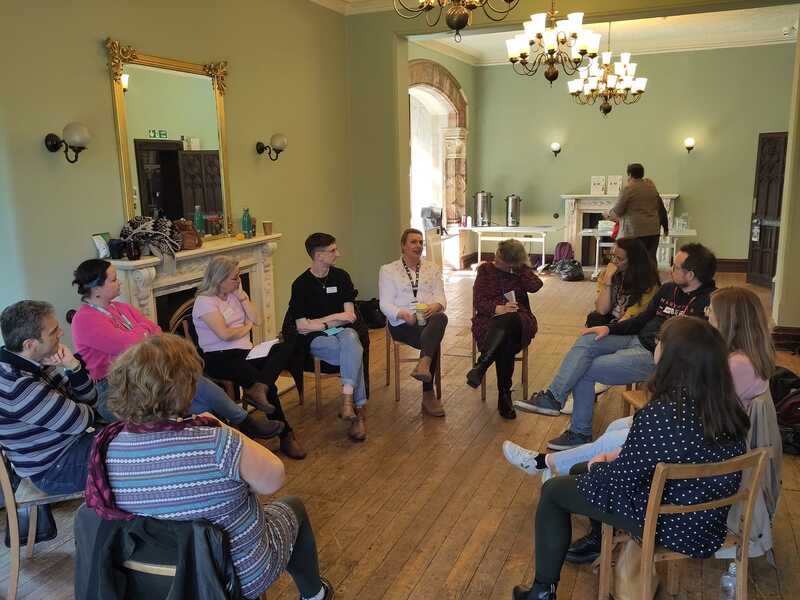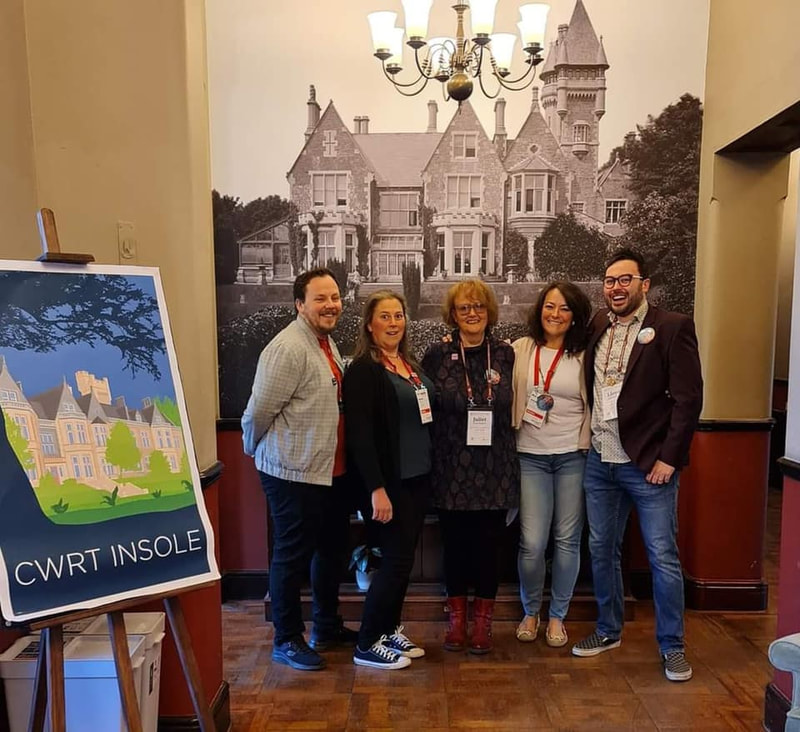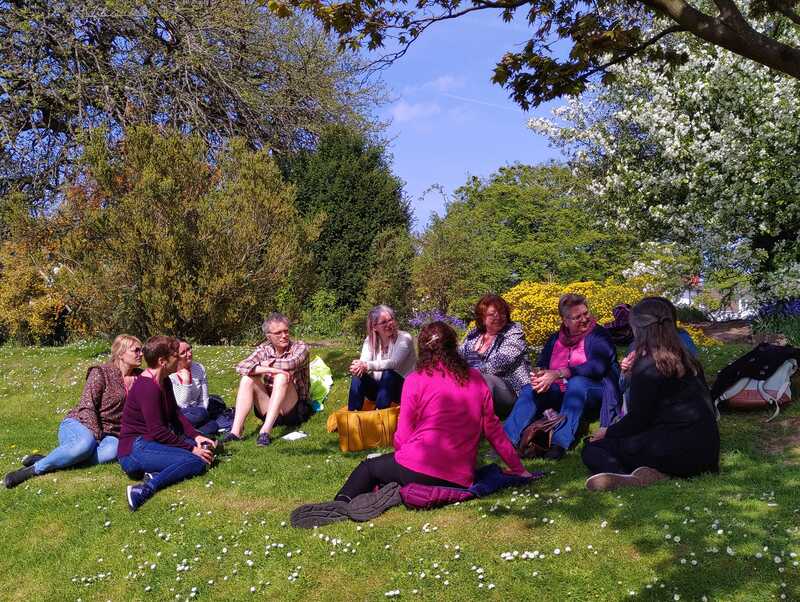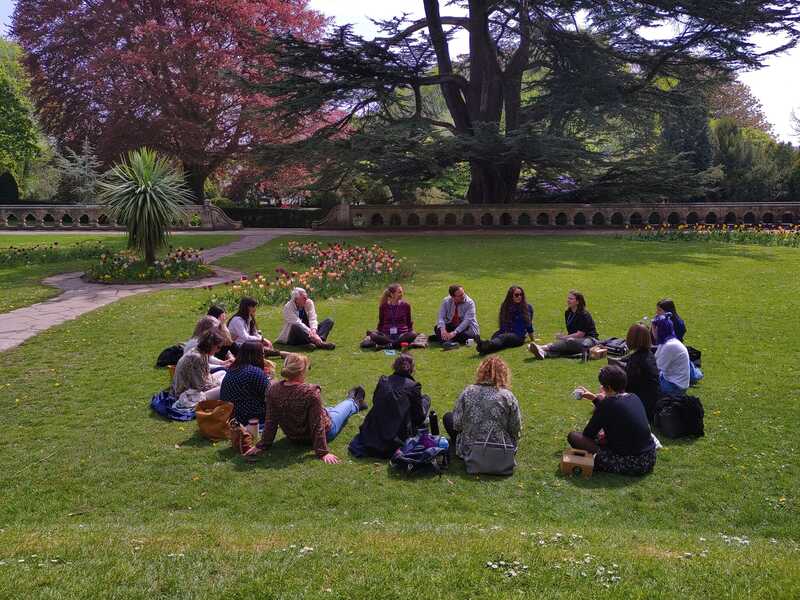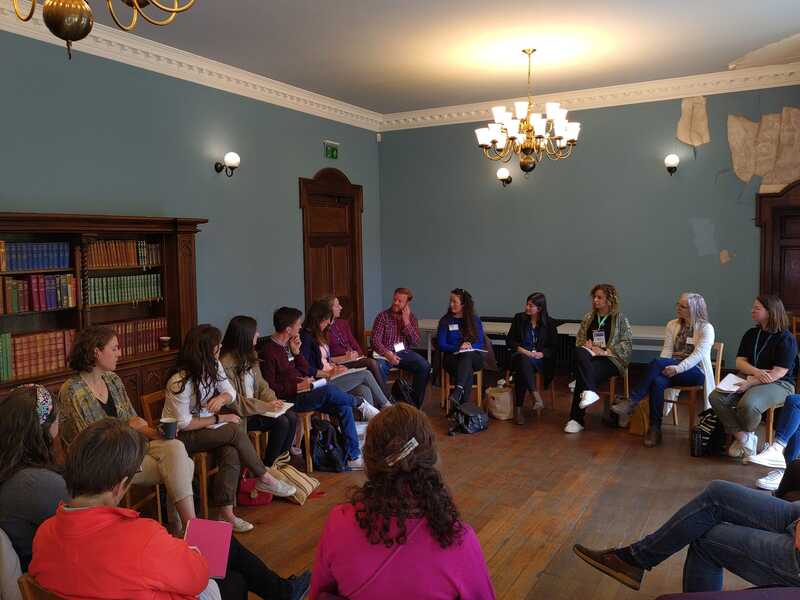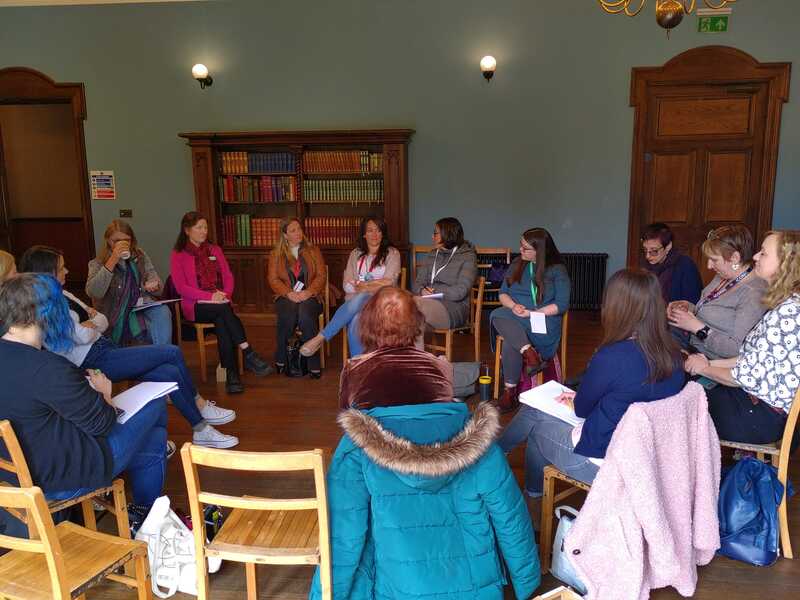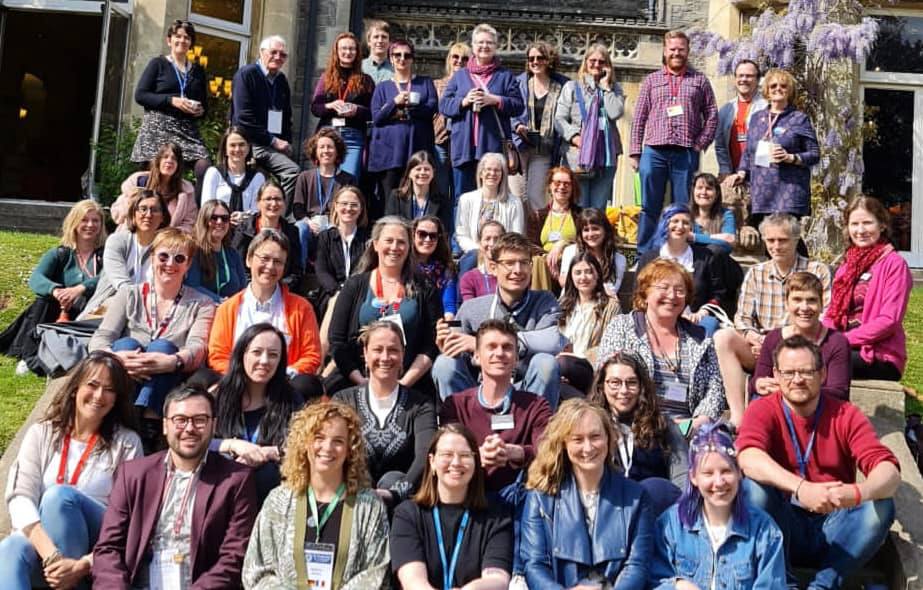2023: "Another unmitigated success"
April 2023 saw the second Cardiff Translation Unconference take place in the Welsh capital. The conference that’s not a conference. While the concept is not entirely new, it still seems to be unique on the translation scene.
First-timer Suzie Withers, second-timer Marjolein Thickett and facilitator Lloyd Bingham report from an attendee’s and facilitator’s perspective respectively.
Suzie: Having joined the profession later in life, I've always felt a sense of urgency about making up for lost time to get my freelance business to where I want it to be. Networking and learning from colleagues seemed like a key part of that process. So, what would an unconference be like?
In my (admittedly limited) experience of traditional conferences, some of the most valuable discussions have happened between presentations, in those stolen moments during the breaks, when people who are too shy to ask a question through the microphone can share their own insights and experiences over coffee or a buffet lunch.
Imagine if a conference was a full day of those otherwise all too brief, peer-to-peer, "intermezzo" discussions. Triggered by a topic, a question or a provocative statement, everyone gets to contribute (if they want to) to a more equitable, round-table discussion. That's an unconference, in a nutshell.
No PowerPoints. No power, in fact. That traditional dynamic of having someone presenting up front and the rest of you sitting in neat rows, listening in awe? There’s none of that. They use a democratic approach to choosing the subjects for the sessions. All attendees were asked to submit a topic months before the event and on the day, you choose your top twelve topics. The three most popular became the three initial sessions and each subsequent set of subjects was selected in a similar way.
Sessions started with the person who suggested the topic introducing their own thoughts on it to open the discussion. The other participants would then start to add their thoughts, ask questions and ponder together on the subject. Exchanges evolved naturally and everyone was free to contribute or just take it all in.
The facilitators were there to ensure that no one dominated the conversation and to step in and suggest that a spin-off discussion be taken elsewhere if there was interest in following up on something in more detail.
The unconference was a much more collaborative, participative way of engaging with colleagues. A recognition of the fact that we all have potentially valuable insights to share, no matter how much experience we have or how comfortable we are up on a stage.
And that's without even mentioning the affordable ticket price and the sustainable ethos – no merch, bring your own lanyard, mug and water bottle, minimal waste, all-vegan food and drink, and encouragement to travel sustainably.
Whilst I don’t yet feel ready to present on stage to my peers at a big conference, I believe I have valuable contributions to make to discussions about our profession, and the unconference is an opportunity to do just that. Would highly recommend!
Marjolein: This was my second visit to the Cardiff Translation Unconference. Both years the conference has taken place, it has been in high demand. This is a conference set up by five translation colleagues all based in and around the city. There are no sky-high fees, unnecessary waste or stuffy conference halls in sight.
The day begins with a large (in my case!) flask of coffee with a glug of oat milk. The first thing you’ll notice on arrival is that there are no disposable cups depressingly stacked up in a corner; one of the core values of this conference is its drastically alternative approach to certain dyed-in-the-wool conference traditions. It focuses on being as green, ethical and sustainable as possible. That means bringing your own water bottle and flask, enjoying a day of fresh vegan food, bringing your own lanyard and/or name badge and travelling as sustainably as possible wherever you go.
The unconference approaches topic selection in a refreshingly simple and inclusive manner – it asks attendees to both contribute topic ideas and choose what gets discussed. Attendees are also encouraged to consider different methods of topic discussion, such as lightning talks, group sessions, troubleshooting, and speed networking
Having submitted our proposals prior to the conference, we voted on the actual day. Subjects were wide-ranging and covered everything from translating in a dementia-friendly manner, seeing MT as a threat or opportunity, and maintaining work-life balance, to dealing with imposter syndrome, collaborating with other freelancers, the use of inclusive language, the renewables market in the UK, and many others. Once everyone had voted and the top topics had emerged, each attendee chose which topic discussion to attend. Throughout the day, there were three further opportunities to vote for topics, and the day was flexible enough to allow for late topic entries that came up as a result of discussions. Groups could choose whether to hold discussions inside or migrate to sunny spots within the grounds. So far, the unconference has always been blessed with glorious sunshine, and we’ve been assured this will also be the case should the conference run in the future...
I attended the sessions ‘collaborating with other freelancers’, ‘achieving work-life balance’, ‘finding direct clients’ and ‘the liberation of writing away from translation’. Each one provided nuggets of inspiration that I will be incorporating into daily life. As usual, the openness and supportiveness of everyone present was brilliant to see.
The actual unconference only features one day of discussion, however the event doesn’t end there. The day before the event, we enjoyed four dinner options and an evening drinks venue. On the day of the conference, all attendees visited a lovely evening drinks and dinner venue, which was once again vegan and excellently inclusive in terms of dietary requirements. Then the day after, many attendees enjoyed a walk around Cardiff and the surrounding area. That’s the thing with the unconference - there are a multitude of opportunities to connect with those around you. The structure of the day is just enough to enable it to run smoothly and provide a worthwhile focus, while being relaxed and informal enough to allow spontaneous connections and chance meetings to take place.
If the Cardiff Translation Unconference runs next year, I strongly advise you book your place as soon as you can!
Lloyd: Put 60 attendees and five facilitators across three rooms in a Victorian mansion in leafy Llandaff and see what they get up to. No keynotes, no presentations, just exchanging experience and sharing best practice. Bottom-up, peer-to-peer professional development for translators that’s also democratic, as it’s the attendees who propose and vote on what they want to talk and learn about.
In 2019, five Cardiff-based translators (Juliet Haydock FITI, Victoria Porter-Burns MITI, Alexandra Chapman MITI, Jason Shilcock MITI and me) got together to organise an affordable, accessible event. One that would also be sustainable: no tat or freebies, vegan catering, and attendees had to bring their own reused name badges and reusable flask and water bottle. Plus, we encouraged attendees to travel there as sustainably as practical.
The first event was initially to take place in September 2020 at the cost-price of £30. We all knew what happened that year. So, two postponements later, we finally went ahead in April 2022… and it was an unmitigated success! (See ITI Bulletin article, July 2022). With such glowing reviews that followed, how could we not hold it again?
We opened ticket sales on 30 September (International Translation Day), this time at £40 (to cover additional room hire), with the registration process in Vicky’s more than capable hands. 2022’s attendees had a three-day head start to get their ticket: our way of saying thank you for believing in and taking a chance on this untested concept. About a third of last year’s attendees ended up coming again, meaning we had two-thirds’ new blood.
On the day itself, the formula that had proven so successful the year before hardly needed to be changed: Alex opened with a couple of icebreakers, including speed networking. Attendees then used the online platform Slido to vote on their phones for the three simultaneous discussions in the four sessions of the day (from a list of topics they submitted in advance), which worked brilliantly thanks to Juliet’s efforts. But unconferencers were also free to form their own group on a different topic at any time and take advantage of the beautiful weather to hold it outside. Each discussion was facilitated by one of the five of us. But very little needed facilitating. Attendees found it easy to sustain to discussions and share different perspectives. Everyone was kept topped up with tea and coffee, courtesy of Jason and his mum Linda.
After a day’s grafting, some attendees headed home but most walked or took the bus into town to join us at BigMoose to unwind over a tapas buffet. But the action didn’t stop there, as some of our unconferencers organised social activities the following day, including a book club and a 6-mile walk along the Taff from castle to castle. A wonderful way to wind down after a day’s graft.
Suzie Withers became a freelance French to English translator in 2020, translating online course materials and high-visibility marketing and social media texts for French-speaking clients in mainland Europe. She draws on over 20 years employed as an IT analyst in financial services.
Marjolein Thickett is a translator and editor living in the Lake District. She translates from Dutch, German and Russian into English and also offers proofreading and copywriting services. She works with a mix of direct clients and agents in her business, The Native Crowd. Marjolein specialises in sustainability and sport.
Lloyd Bingham MITI runs Capital Translations in Cardiff. He works from Dutch, German, French and Spanish into English, specialising in business, technology and education. Lloyd is a member and director of ITI and the coordinator of ITI Cymru Wales.
First-timer Suzie Withers, second-timer Marjolein Thickett and facilitator Lloyd Bingham report from an attendee’s and facilitator’s perspective respectively.
Suzie: Having joined the profession later in life, I've always felt a sense of urgency about making up for lost time to get my freelance business to where I want it to be. Networking and learning from colleagues seemed like a key part of that process. So, what would an unconference be like?
In my (admittedly limited) experience of traditional conferences, some of the most valuable discussions have happened between presentations, in those stolen moments during the breaks, when people who are too shy to ask a question through the microphone can share their own insights and experiences over coffee or a buffet lunch.
Imagine if a conference was a full day of those otherwise all too brief, peer-to-peer, "intermezzo" discussions. Triggered by a topic, a question or a provocative statement, everyone gets to contribute (if they want to) to a more equitable, round-table discussion. That's an unconference, in a nutshell.
No PowerPoints. No power, in fact. That traditional dynamic of having someone presenting up front and the rest of you sitting in neat rows, listening in awe? There’s none of that. They use a democratic approach to choosing the subjects for the sessions. All attendees were asked to submit a topic months before the event and on the day, you choose your top twelve topics. The three most popular became the three initial sessions and each subsequent set of subjects was selected in a similar way.
Sessions started with the person who suggested the topic introducing their own thoughts on it to open the discussion. The other participants would then start to add their thoughts, ask questions and ponder together on the subject. Exchanges evolved naturally and everyone was free to contribute or just take it all in.
The facilitators were there to ensure that no one dominated the conversation and to step in and suggest that a spin-off discussion be taken elsewhere if there was interest in following up on something in more detail.
The unconference was a much more collaborative, participative way of engaging with colleagues. A recognition of the fact that we all have potentially valuable insights to share, no matter how much experience we have or how comfortable we are up on a stage.
And that's without even mentioning the affordable ticket price and the sustainable ethos – no merch, bring your own lanyard, mug and water bottle, minimal waste, all-vegan food and drink, and encouragement to travel sustainably.
Whilst I don’t yet feel ready to present on stage to my peers at a big conference, I believe I have valuable contributions to make to discussions about our profession, and the unconference is an opportunity to do just that. Would highly recommend!
Marjolein: This was my second visit to the Cardiff Translation Unconference. Both years the conference has taken place, it has been in high demand. This is a conference set up by five translation colleagues all based in and around the city. There are no sky-high fees, unnecessary waste or stuffy conference halls in sight.
The day begins with a large (in my case!) flask of coffee with a glug of oat milk. The first thing you’ll notice on arrival is that there are no disposable cups depressingly stacked up in a corner; one of the core values of this conference is its drastically alternative approach to certain dyed-in-the-wool conference traditions. It focuses on being as green, ethical and sustainable as possible. That means bringing your own water bottle and flask, enjoying a day of fresh vegan food, bringing your own lanyard and/or name badge and travelling as sustainably as possible wherever you go.
The unconference approaches topic selection in a refreshingly simple and inclusive manner – it asks attendees to both contribute topic ideas and choose what gets discussed. Attendees are also encouraged to consider different methods of topic discussion, such as lightning talks, group sessions, troubleshooting, and speed networking
Having submitted our proposals prior to the conference, we voted on the actual day. Subjects were wide-ranging and covered everything from translating in a dementia-friendly manner, seeing MT as a threat or opportunity, and maintaining work-life balance, to dealing with imposter syndrome, collaborating with other freelancers, the use of inclusive language, the renewables market in the UK, and many others. Once everyone had voted and the top topics had emerged, each attendee chose which topic discussion to attend. Throughout the day, there were three further opportunities to vote for topics, and the day was flexible enough to allow for late topic entries that came up as a result of discussions. Groups could choose whether to hold discussions inside or migrate to sunny spots within the grounds. So far, the unconference has always been blessed with glorious sunshine, and we’ve been assured this will also be the case should the conference run in the future...
I attended the sessions ‘collaborating with other freelancers’, ‘achieving work-life balance’, ‘finding direct clients’ and ‘the liberation of writing away from translation’. Each one provided nuggets of inspiration that I will be incorporating into daily life. As usual, the openness and supportiveness of everyone present was brilliant to see.
The actual unconference only features one day of discussion, however the event doesn’t end there. The day before the event, we enjoyed four dinner options and an evening drinks venue. On the day of the conference, all attendees visited a lovely evening drinks and dinner venue, which was once again vegan and excellently inclusive in terms of dietary requirements. Then the day after, many attendees enjoyed a walk around Cardiff and the surrounding area. That’s the thing with the unconference - there are a multitude of opportunities to connect with those around you. The structure of the day is just enough to enable it to run smoothly and provide a worthwhile focus, while being relaxed and informal enough to allow spontaneous connections and chance meetings to take place.
If the Cardiff Translation Unconference runs next year, I strongly advise you book your place as soon as you can!
Lloyd: Put 60 attendees and five facilitators across three rooms in a Victorian mansion in leafy Llandaff and see what they get up to. No keynotes, no presentations, just exchanging experience and sharing best practice. Bottom-up, peer-to-peer professional development for translators that’s also democratic, as it’s the attendees who propose and vote on what they want to talk and learn about.
In 2019, five Cardiff-based translators (Juliet Haydock FITI, Victoria Porter-Burns MITI, Alexandra Chapman MITI, Jason Shilcock MITI and me) got together to organise an affordable, accessible event. One that would also be sustainable: no tat or freebies, vegan catering, and attendees had to bring their own reused name badges and reusable flask and water bottle. Plus, we encouraged attendees to travel there as sustainably as practical.
The first event was initially to take place in September 2020 at the cost-price of £30. We all knew what happened that year. So, two postponements later, we finally went ahead in April 2022… and it was an unmitigated success! (See ITI Bulletin article, July 2022). With such glowing reviews that followed, how could we not hold it again?
We opened ticket sales on 30 September (International Translation Day), this time at £40 (to cover additional room hire), with the registration process in Vicky’s more than capable hands. 2022’s attendees had a three-day head start to get their ticket: our way of saying thank you for believing in and taking a chance on this untested concept. About a third of last year’s attendees ended up coming again, meaning we had two-thirds’ new blood.
On the day itself, the formula that had proven so successful the year before hardly needed to be changed: Alex opened with a couple of icebreakers, including speed networking. Attendees then used the online platform Slido to vote on their phones for the three simultaneous discussions in the four sessions of the day (from a list of topics they submitted in advance), which worked brilliantly thanks to Juliet’s efforts. But unconferencers were also free to form their own group on a different topic at any time and take advantage of the beautiful weather to hold it outside. Each discussion was facilitated by one of the five of us. But very little needed facilitating. Attendees found it easy to sustain to discussions and share different perspectives. Everyone was kept topped up with tea and coffee, courtesy of Jason and his mum Linda.
After a day’s grafting, some attendees headed home but most walked or took the bus into town to join us at BigMoose to unwind over a tapas buffet. But the action didn’t stop there, as some of our unconferencers organised social activities the following day, including a book club and a 6-mile walk along the Taff from castle to castle. A wonderful way to wind down after a day’s graft.
Suzie Withers became a freelance French to English translator in 2020, translating online course materials and high-visibility marketing and social media texts for French-speaking clients in mainland Europe. She draws on over 20 years employed as an IT analyst in financial services.
Marjolein Thickett is a translator and editor living in the Lake District. She translates from Dutch, German and Russian into English and also offers proofreading and copywriting services. She works with a mix of direct clients and agents in her business, The Native Crowd. Marjolein specialises in sustainability and sport.
Lloyd Bingham MITI runs Capital Translations in Cardiff. He works from Dutch, German, French and Spanish into English, specialising in business, technology and education. Lloyd is a member and director of ITI and the coordinator of ITI Cymru Wales.
2022: "An unmitigated success"
Held on Friday 29 April 2022, after five long years in the making, the Cardiff Translation Unconference went down a storm, with some attendees expecting this atypical format of professional development to permanently change the landscape of conferences in the translation sector.
Dot Roberts AITI and Lloyd Bingham MITI report from an attendee’s and facilitator’s perspective respectively.
Lloyd: A bottom-up, peer-to-peer event for translators to share knowledge and experience in an informal setting: that’s how we billed the Cardiff Translation Unconference. No keynotes, no death by PowerPoint, just 55 translators all swapping experience and best practice. An unconference is also democratic: it’s the attendees who decide what they want to talk and learn about.
The idea originally came from Juliet Haydock FITI in 2017, who thought, “I wish we could organise a cheap and accessible event”. “What you’re thinking of is called an unconference”, replied then-translator Richard Lackey. She floated the idea with fellow Cardiff translators Victoria Porter-Burns MITI, Alexandra Chapman MITI, Jason Shilcock and me. The thought of trialling this as (what we believe to be) the first major stand-alone translation unconference was energising. But it took two years to gradually hash out all the details.
Something else we wanted the unconference to be was sustainable. We didn’t give out any freebies that would end up wasted. We asked everyone to bring a name badge from a previous conference, as well as their reusable flask and water bottle. The nutritious and plentiful lunch was entirely vegan, and we provided only sustainably produced milks for tea and coffee. Plus, we encouraged attendees to travel there as sustainably as practical.
We settled on a date of 26 September 2020, with tickets going on sale that February at the cost-price of £30. We wanted the unconference to be financially accessible to everyone. Then in spring of that year, Covid hit. We hoped things would be alright after a few months. But as the First Minister extended restrictions every three weeks, there was no doubt we wouldn’t be able to hold the event that year under the conditions we wanted. So, in June, we postponed until spring 2021, but as autumn set in, Wales introduced county-by-county restrictions. By November, the whole country was back in lockdown. Even if we were out of lockdown by the spring, it was clear face masks and social distancing would be needed, not really compatible with an event of this nature.
January 2021 came, and we postponed it again – this time by a whole year to April 2022. As the new year dawned, restrictions were relaxed and finally dropped all together. Things just got real! We five facilitators began having weekly Zoom meetings to hammer out the details. You wouldn’t believe how long it took us to agree on something as trivial as how we were going to refill the urns for tea and coffee. But there were rarely any real tensions, and we managed to come to a consensus on most things, resorting to a majority vote otherwise. The fact that we were already colleagues and good friends really helped, as we knew what kind of people we all were if there was ever a risk that something could be taken the wrong way.
There was a surprising amount of planning to do for a conference that left so much until the day itself. I was trying to think of what could go wrong and create a contingency plan. What if the wi-fi didn’t work? What if the conversation dried up? The good thing about having five close colleagues as the organising team was that we all acted like a sounding board and helped fine-tune ideas. And no-one was afraid to say: “Lloyd, chill out and stop overthinking things.”
The big day came, and the atmosphere felt wonderfully positive. The icebreaker, coordinated by Alex, helped to break down barriers. Attendees then used the online platform Slido to vote on their phones for the three simultaneous discussions per session (from a list of topics they submitted in advance), which worked brilliantly thanks to Juliet’s efforts. Each discussion was facilitated by one of the five of us. We consciously chose the word ‘facilitator’ and avoided the word ‘presenter’, because no-one presents at an unconference. Everyone is expected to simply contribute their thoughts and experiences, with as little input from the facilitators as possible. Everyone was kept topped up with tea and coffee, courtesy of Jason and his mum Linda. The sustainable lunch made primarily with local ingredients was arranged by Vicky.
Dot: The unconference was an absolute dream. I’d actually never been to a translation conference before, but wow, this was exactly how I would want it to be. Prior to the unconference, we all had to fill in a form with a few topics we’d be interested in discussing. This was so that everyone had a chance to speak about something and join in the conversation, rather than individual people giving presentations as you might see in a typical conference.
Once we got to the venue, a beautiful Victorian mansion called Insole Court, we were greeted by lots of friendly faces. Since the unconference had a focus on sustainability, we brought our own lanyards, mugs, water bottles, note pads, and pens, so there were no unnecessary extras to pick up at the start.
The unconference began with a short introduction from the wonderful facilitators: Juliet, Alex, Jason, Vicky, and Lloyd. Alex then started us off with an icebreaker. She divided the room into two groups, and our first task was to arrange ourselves in alphabetical order according to our first names. Our second task was to arrange ourselves in order of who travelled the smallest to largest distance to get to Cardiff, but without speaking English. For our final task – Welsh whispers – Alex whispered a phrase to the person at each end of the line to pass the message down until it reached the middle. Both sides got it correct! “The Cardiff Translation Unconference will be an unmitigated success”. And it sure was.
After voting for our favourite topics, the three chosen for the first session were rates and pay, finding the right clients, and source vs target language. I joined in the chat about finding clients, and it was interesting to hear everyone’s methods and the different types of clients that people preferred to work with. The topics for session two were mentoring and outreach, networking and collaboration, and MT and PEMT. I joined the discussion about mentoring, and we chatted about the kind of mentoring we can offer, and how it can benefit both new and experienced translators.
We then broke for lunch. We each received a lunchbox full of vegan treats – sandwiches, small pasties, Welsh cakes, and even a chocolate muffin, all provided by the wonderful local catering company, Earthly. We chose to sit outside on the grass and enjoy the sunshine. I accidentally fell down a hill, of course, but overcame my embarrassment and made myself a daisy chain crown, which I then wore for the rest of the day.
After lunch, we had another three sessions: marketing and making a business plan, time management, and personal branding. Personal branding was a topic that Fiona, Kelsey, and I had submitted, so we led this session together. We chose to sit outside on the grass, and we had an interesting chat about what our personal brands are, how we create them, and how they benefit us.
The final session of the day was my favourite. The discussion topics were inclusive writing, getting away from the source, and mental health. I joined in with the mental health session, and everyone was super open and honest, sharing our personal experiences with mental health and our work, and things that we do to improve our mental health.
The facilitators did a closing speech in the gardens, and we thanked them all for the amazing event. Many of us then headed to a local pub for pizza and drinks. After the unmitigated success of the unconference, it was a great chance to relax and get to know each other even better. And the pizza was delicious.
The day after the unconference, Lloyd took us on a tour of central Cardiff, telling us about some of the capital’s history. We saw Cardiff Castle, Bute Park, City Hall, and the National Museum, before hopping on a bus to Cardiff Bay to see the Wales Millennium Centre, the Welsh Parliament and the Norwegian Church. It was a wonderful sunny day and felt just like a summer holiday. We stopped for lunch at The Dock before taking the waterbus back to the city centre. That’s when we said our final goodbyes and I headed back up to Manchester.
The Cardiff Translation Unconference was incredible. I had such an amazing time meeting new and familiar translators, learning from each other, and making friends. I absolutely loved the intimate and informal vibes and I just felt so comfortable and able to fully be myself. I really hope there’s another one next year – I’m already itching to get back to Cardiff and see everyone again!
Dot Roberts AITI is a translator and subtitler working with German and Dutch into English, specialising in marketing and entertainment. She’s based in Manchester and is an active member of the NWTN events team. She also hosts her own podcast called Meet the Translator.
Lloyd Bingham MITI runs Capital Translations in Cardiff. He works from Dutch, German, French and Spanish into English, specialising in business, technology and education. Lloyd is a member of SENSE, a committee member of ITI Cymru Wales and a member of the ITI Board of Directors.
Dot Roberts AITI and Lloyd Bingham MITI report from an attendee’s and facilitator’s perspective respectively.
Lloyd: A bottom-up, peer-to-peer event for translators to share knowledge and experience in an informal setting: that’s how we billed the Cardiff Translation Unconference. No keynotes, no death by PowerPoint, just 55 translators all swapping experience and best practice. An unconference is also democratic: it’s the attendees who decide what they want to talk and learn about.
The idea originally came from Juliet Haydock FITI in 2017, who thought, “I wish we could organise a cheap and accessible event”. “What you’re thinking of is called an unconference”, replied then-translator Richard Lackey. She floated the idea with fellow Cardiff translators Victoria Porter-Burns MITI, Alexandra Chapman MITI, Jason Shilcock and me. The thought of trialling this as (what we believe to be) the first major stand-alone translation unconference was energising. But it took two years to gradually hash out all the details.
Something else we wanted the unconference to be was sustainable. We didn’t give out any freebies that would end up wasted. We asked everyone to bring a name badge from a previous conference, as well as their reusable flask and water bottle. The nutritious and plentiful lunch was entirely vegan, and we provided only sustainably produced milks for tea and coffee. Plus, we encouraged attendees to travel there as sustainably as practical.
We settled on a date of 26 September 2020, with tickets going on sale that February at the cost-price of £30. We wanted the unconference to be financially accessible to everyone. Then in spring of that year, Covid hit. We hoped things would be alright after a few months. But as the First Minister extended restrictions every three weeks, there was no doubt we wouldn’t be able to hold the event that year under the conditions we wanted. So, in June, we postponed until spring 2021, but as autumn set in, Wales introduced county-by-county restrictions. By November, the whole country was back in lockdown. Even if we were out of lockdown by the spring, it was clear face masks and social distancing would be needed, not really compatible with an event of this nature.
January 2021 came, and we postponed it again – this time by a whole year to April 2022. As the new year dawned, restrictions were relaxed and finally dropped all together. Things just got real! We five facilitators began having weekly Zoom meetings to hammer out the details. You wouldn’t believe how long it took us to agree on something as trivial as how we were going to refill the urns for tea and coffee. But there were rarely any real tensions, and we managed to come to a consensus on most things, resorting to a majority vote otherwise. The fact that we were already colleagues and good friends really helped, as we knew what kind of people we all were if there was ever a risk that something could be taken the wrong way.
There was a surprising amount of planning to do for a conference that left so much until the day itself. I was trying to think of what could go wrong and create a contingency plan. What if the wi-fi didn’t work? What if the conversation dried up? The good thing about having five close colleagues as the organising team was that we all acted like a sounding board and helped fine-tune ideas. And no-one was afraid to say: “Lloyd, chill out and stop overthinking things.”
The big day came, and the atmosphere felt wonderfully positive. The icebreaker, coordinated by Alex, helped to break down barriers. Attendees then used the online platform Slido to vote on their phones for the three simultaneous discussions per session (from a list of topics they submitted in advance), which worked brilliantly thanks to Juliet’s efforts. Each discussion was facilitated by one of the five of us. We consciously chose the word ‘facilitator’ and avoided the word ‘presenter’, because no-one presents at an unconference. Everyone is expected to simply contribute their thoughts and experiences, with as little input from the facilitators as possible. Everyone was kept topped up with tea and coffee, courtesy of Jason and his mum Linda. The sustainable lunch made primarily with local ingredients was arranged by Vicky.
Dot: The unconference was an absolute dream. I’d actually never been to a translation conference before, but wow, this was exactly how I would want it to be. Prior to the unconference, we all had to fill in a form with a few topics we’d be interested in discussing. This was so that everyone had a chance to speak about something and join in the conversation, rather than individual people giving presentations as you might see in a typical conference.
Once we got to the venue, a beautiful Victorian mansion called Insole Court, we were greeted by lots of friendly faces. Since the unconference had a focus on sustainability, we brought our own lanyards, mugs, water bottles, note pads, and pens, so there were no unnecessary extras to pick up at the start.
The unconference began with a short introduction from the wonderful facilitators: Juliet, Alex, Jason, Vicky, and Lloyd. Alex then started us off with an icebreaker. She divided the room into two groups, and our first task was to arrange ourselves in alphabetical order according to our first names. Our second task was to arrange ourselves in order of who travelled the smallest to largest distance to get to Cardiff, but without speaking English. For our final task – Welsh whispers – Alex whispered a phrase to the person at each end of the line to pass the message down until it reached the middle. Both sides got it correct! “The Cardiff Translation Unconference will be an unmitigated success”. And it sure was.
After voting for our favourite topics, the three chosen for the first session were rates and pay, finding the right clients, and source vs target language. I joined in the chat about finding clients, and it was interesting to hear everyone’s methods and the different types of clients that people preferred to work with. The topics for session two were mentoring and outreach, networking and collaboration, and MT and PEMT. I joined the discussion about mentoring, and we chatted about the kind of mentoring we can offer, and how it can benefit both new and experienced translators.
We then broke for lunch. We each received a lunchbox full of vegan treats – sandwiches, small pasties, Welsh cakes, and even a chocolate muffin, all provided by the wonderful local catering company, Earthly. We chose to sit outside on the grass and enjoy the sunshine. I accidentally fell down a hill, of course, but overcame my embarrassment and made myself a daisy chain crown, which I then wore for the rest of the day.
After lunch, we had another three sessions: marketing and making a business plan, time management, and personal branding. Personal branding was a topic that Fiona, Kelsey, and I had submitted, so we led this session together. We chose to sit outside on the grass, and we had an interesting chat about what our personal brands are, how we create them, and how they benefit us.
The final session of the day was my favourite. The discussion topics were inclusive writing, getting away from the source, and mental health. I joined in with the mental health session, and everyone was super open and honest, sharing our personal experiences with mental health and our work, and things that we do to improve our mental health.
The facilitators did a closing speech in the gardens, and we thanked them all for the amazing event. Many of us then headed to a local pub for pizza and drinks. After the unmitigated success of the unconference, it was a great chance to relax and get to know each other even better. And the pizza was delicious.
The day after the unconference, Lloyd took us on a tour of central Cardiff, telling us about some of the capital’s history. We saw Cardiff Castle, Bute Park, City Hall, and the National Museum, before hopping on a bus to Cardiff Bay to see the Wales Millennium Centre, the Welsh Parliament and the Norwegian Church. It was a wonderful sunny day and felt just like a summer holiday. We stopped for lunch at The Dock before taking the waterbus back to the city centre. That’s when we said our final goodbyes and I headed back up to Manchester.
The Cardiff Translation Unconference was incredible. I had such an amazing time meeting new and familiar translators, learning from each other, and making friends. I absolutely loved the intimate and informal vibes and I just felt so comfortable and able to fully be myself. I really hope there’s another one next year – I’m already itching to get back to Cardiff and see everyone again!
Dot Roberts AITI is a translator and subtitler working with German and Dutch into English, specialising in marketing and entertainment. She’s based in Manchester and is an active member of the NWTN events team. She also hosts her own podcast called Meet the Translator.
Lloyd Bingham MITI runs Capital Translations in Cardiff. He works from Dutch, German, French and Spanish into English, specialising in business, technology and education. Lloyd is a member of SENSE, a committee member of ITI Cymru Wales and a member of the ITI Board of Directors.
